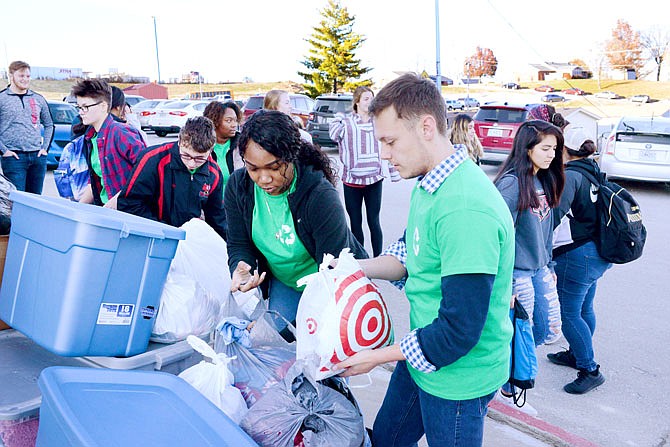Jefferson City High School students on Friday showed the results of their efforts to prevent fruits of the loom from taking up space rotting in landfills.
The JCHS Green Team has previously worked to examine how much food waste the high school could compost and pushed for the school district to use reusable trays and silverware instead of disposable plastic foam products.
For the past two weeks, juniors Claire Lewis and Rani Patel said the team has been collecting used clothes that would otherwise probably end up in a landfill.
The Green Team's faculty sponsor Melanie Fraga shared Friday that students had collected 617 pounds of clothes that were being donated to the Salvation Army instead of going to a landfill.
Patel said people could have donated the clothes that were already laying around their homes on their own, but the team's push - through "lots of social media," along with announcements, word of mouth and a slideshow Lewis said ran in the school cafeteria - "forced them to bring their clothes from their house."
"We got a lot of donations later in the week," Lewis said, and Patel added most donations were at least as big as a trash-bag full of clothes.
Along with being able to help people in need, Lewis said another reason to keep clothes out of landfills is because "textile waste is a really big polluter."
She's interested in the issues presented by "fast fashion" - the clothes society consumes as quickly and cheaply as fast food, that are no longer quality homemade or retail-bought items but instead are woven of cheap, fossil fuel-based materials.
Landfills received 11.2 million tons of textiles in 2017, according to the U.S. Environmental Protection Agency. That 11.2 million tons represented 8 percent of all landfilled municipal solid waste.
The EPA's definition of textile waste includes "discarded clothing, although other smaller sources include furniture, carpets, tires, footwear, and other nondurable goods such as sheets and towels."
The EPA reported clothing and footwear made up 8.9 million tons of the textile waste that was landfilled in 2017, based on information from the American Apparel & Footwear Association, American Textile Recycling Service and International Trade Commission.
The U.S. is recycling significantly more clothing and footwear than it used to - 1.74 million tons in 2017, compared to 50,000 tons in 1960.
More clothing and footwear waste is also being burned for energy - 2.16 million tons in 2017, compared to 10,000 tons in 1970.
However, even the expanded capacities of both those waste management methods combined has failed to keep up with how much clothing and footwear municipal solid waste is being generated - 12.8 million tons in 2017, compared to 1.36 million tons in 1960.
In other words, the U.S. did recycle about 13.6 percent of its clothing and footwear waste in 2017, compared to recycling about 3.7 percent of it in 1960, but the amount of that waste being generated also grew by more than 841 percent over the years between.
The amount of clothing and footwear waste being generated each year grew more than 62 percent between 2005-17 alone.
"It means we actually did something," Lewis said of how seeing the pile of used clothes collected for donation made her feel.
Fraga said plastic foam products have been appearing again in the cafeteria, but students can request reusable trays and set an example for people around them.
"We'll do it again," Lewis said of the clothing drive, though donations are no longer being accepted currently.

